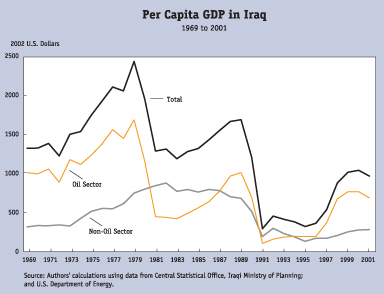Economic Policy and Prospects in Iraq 
Motivation for the Research
Economic reform was central to the Coalition Provisional Authority's attempts to rebuild Iraq. This paper describes the Coalition's attempts to stabilize and reform Iraq's economy along market lines.
Research Approach
The authors piece together, adjust, and analyze data from official and other sources to develop an overview of the performance of the Iraqi economy at the macro level over the past 35 years, as backdrop to the current situation. They then evaluate the impact of the steps undertaken by the Coalition to stabilize and restart the economy, and they assess the economy's future prospects.
Key Findings
- Iraq's economic meltdown has been the result of three wars: the nation's eight-year war with Iran, the Persian Gulf War, and the war to replace the Saddam Hussein regime.
- With respect to the current situation, while security concerns remain serious, Iraq's economy has not been crippled by violence.
- Since the end of the conflict, small businesses have been able to grow and thrive despite domestic unrest, and a plurality of Iraqis believe that the employment situation in Iraq is better now than before the war.
- Unemployment remains high, and a large majority of Iraqis believe that improved job opportunities would reduce violence.
Implications
Sustained economic growth will depend on whether Iraq's future leaders pursue the pro-market approaches the Coalition has advocated. If the Iraqi economy is to reach its potential, Iraq's future government will need to go even further than the Coalition did, implementing reforms the Coalition did not pursue because of security concerns.


 About the Authors
About the Authors
Christopher L. Foote,
Federal Reserve Bank of Boston
Email: Chris.Foote@bos.frb.org
William Block
Keith Crane
Simon Gray



